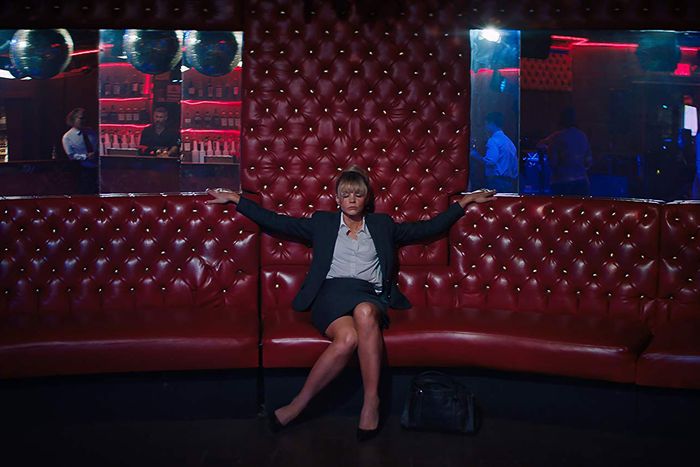
The rape-revenge trope has permeated through Hollywood over the years, especially in horror, gaining notoriety with the infamous I Spit On Your Grave in 1978. These films often offer stories of vigilantism and vengeance, but not before the female protagonist is put through unbearable physical and psychological agony. Recent offerings of this genre like 2017’s Revenge continue this trope of the female character being put through extreme violence before positioning her as victorious over the men who are responsible. The Guardian wrote, “traditionally associated with grindhouse misogyny and BBFC-vexing video nasties, it’s a format that by its very nature hinges on sexual violence.” In Promising Young Woman director and writer Emerald Fennell deceives viewers, taking them to the edge of a traditional brutal and blood-soaked revenge film only to upend them. The film seamlessly blends elements of dark-comedy, thriller, and 90’s romantic comedy that turns the revenge film on its head. “The most macabre, terrible things are the things we tend to laugh at to make sense of them and make them bearable,” Fennell explains to Variety. Cassie, played by Carrie Mulligan, serves as an avenging angel for her best friend Nina’s sexual assault and subsequent suicide.
The film opens in a nightclub, Charlie XCX’s “Boys” playing over a crowd of corporate bros dancing and drinking. Cassie, alone, seems too drunk to stand, and is falling off her seat when she’s noticed by a group of three men. Jerry, played by Adam Brody, is the gentleman of his friend group–the only one not judging Cassie or claiming that she’s asking for it. Jerry offers to take Cassie home, but halfway through the ride he detours to his apartment. Cassie lies down on his bed and Jerry attempts to have sex with her while Cassie repeatedly asks “What are you doing?” and Jerry responds, “It’s okay you’re safe.” Cassie abruptly reveals that she is sober, sits up, and with conviction repeats, “Hey, I said what are you doing?” The scene cuts to the next morning, Cassie walks on the pavement barefoot with a bloody stain on her leg. The camera pans up and the blood stain is revealed to be ketchup spillage from her hot dog. Cassie is not a killer; she is a grief stricken vigilante attempting to implement an unforgettable lesson in consent.
Cassie hasn’t moved on from the loss of Nina. She has dropped out of med school, doesn’t have any friends, and has no desire to create a future for herself. She casts her vengeance psychologically, often at her own expense. At night, she expertly plays to the male gaze to avenge Nina, but it’s clear that this weekly occurrence has taken over her life.
Fennell pairs Cassie’s grief and trauma with a dream-like atmosphere of saturated pastels, neon 80’s inspired set design, and a bubble gum pop soundtrack that centers Paris Hilton’s “Stars Are Blind.” “A lot of nasty things happen in beautiful places,” she explains to The Huffington Post. The enchanting appearance of the film cloaks the anguished inner world of Cassie and the dark and violent plot of the film, creating a paradox of candy-coated rage and loss that demonstrates how deceptive appearances can be.
Fennell also comments on the deceptive appearance of seemingly nice guys. She strategically uses actors Bo Burnham (Eighth Grade), Christopher Mintz-Plasse (Superbad), Adam Brody (The O.C.), and Max Greenfield (New Girl) to show that anyone can be a predator. These actors are known for roles with virtuous roots that defer us from distrust and suspicion, but in Promising Young Woman their predatory nature surfaces. “Every woman knows a nice guy who at some point revealed himself to be not so nice,” Fennell tells GQ. All of the film’s male characters are not evil to their core–they even believe themselves to be nice guys–but all of them participate or are passive in the culture of sexual assault. One doesn’t have to be a monster to be culpable.
With its dream-like setting and violent and tragic narrative, Promising Young Woman invites the audience to consider the deceptive appearances and destructive systems that enable a culture of sexual assault. Suffering from abuse should not be a societal or a literal death sentence for women. Young men aren’t the only ones who have a promising life ahead of them.
